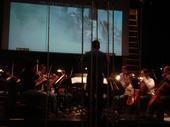Layout by CoolChaser
Biography by Jonathan Manness
Jonathan Manness, published composer, has written music for film, multimedia, and concert setting. His music has been described as "solid, yet sensitive and magical," and "expertly written [and] deeply felt." Even though he composes for multiple genres, Manness's music engages performers and audiences without compromising his own artistic integrity. Ultimately, the emotional undertones of the material become the basis of his work.
Film and commercial credits include working with such filmmakers as Tim Leaton, Andy Fortenbacher, Ruth Du, Mauro Mueller, and Jessie Levandov. Manness's underscores have ranged from the Hollywood orchestral drama and comedy to the contemporary indie soundtrack, all of which ultimately support the narrative. In 2008, ASCAP's "I Create Music" EXPO recognized Manness's music for "Score a 'Film Your Issue' Short" as "among the very best..."
Performance venues of Manness's concert music include the Perelman Theater at the Kimmel Center, Chris' Jazz Cafe, the Collective, New York University, and West Chester University. In April 2007, he was selected to have his first brass quintet work, Punxsutawney Fails to See His Shadow!, read by the American Brass Quintet. His one-movement string quartet, Last Call, is constantly aired on "New Music Philadelphia," a webcast that features Philadelphia composers. Jonathan's jazz band arrangement, Bolivia, can be heard on two promotional CDs: West Chester University Recorded Live at the Kimmel Center and Writer's Cramp.
Manness received his B.M. in Music Theory and Composition (summa cum laude) from West Chester University in West Chester, PA where he studied with Robert Maggio and Peter Paulsen. Currently, he is pursuing his M.M. in Composition with a Concentration in Scoring for Film and Multimedia at New York University where he studied with Deniz Hughes. Manness also works with award-winning composer Richard Einhorn (Voices of Light).
Recently, Jonathan Manness collaborated with choreographer Hee Ra Yoo on a large-scale modern dance piece entitled Who Speaks for Wolf, based on a Native American learning story by Paula Underwood. Who Speaks for Wolf premiered in late-November and was supported in part by a Creative Collaboration Support Grant from the New York University Coordinating Council for Music and by the Korean Cultural Service NY.
